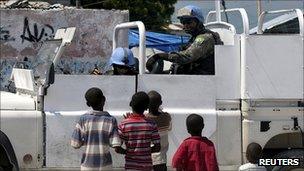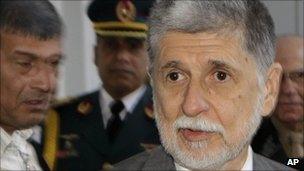Brazil plans Haiti peacekeeping withdrawal, says Amorim
- Published

Brazilian troops are the mainstay of the peacekeeping operation
Brazil plans to start withdrawing troops from the UN peacekeeping mission it leads in Haiti, Defence Minister Celso Amorim has said.
The gradual reduction would be co-ordinated with the UN and other South American nations with troops in Haiti.
"We can't have a disorganised exit that creates a situation of chaos," Mr Amorim told the BBC.
Mr Amorim said the security situation in Haiti had substantially improved since the mission began in 2004.
He noted that there had been two democratic elections since the force was deployed.
"Political science manuals teach that the second election shows that democracy has been established," Mr Amorim said.
"In the medium and long term, it is not good for Haiti and it is not good for those who are there that the mission be perpetuated," he added.
But Mr Amorim said no timetable had been drawn up for the reduction and eventual withdrawal of peacekeeping troops.
And he said the Brazilian draw-down would initially be limited, as Brazilian troops had responsibility for the capital, Port-au-Prince.

Mr Amorim says there will be no rush to exit Haiti
Controversy
There are more than 2,000 Brazilian troops in Haiti, out of a total UN force of around 12,000.
Brazil's leadership of the UN force has been seen as a test of its ambition to play a greater role in regional security as it seeks a permanent seat on the UN Security Council.
The peacekeepers were brought in to Haiti to restore order following the overthrow of President Jean-Bertrand Aristide in 2004.
The force was expanded after the devastating earthquake in January 2010, which killed more than 200,000 people and left the capital, Port-au-Prince in ruins.
But the UN mission has been dogged by controversy.
Last year there were widespread protests after Nepalese peacekeepers were accused of being the source of a cholera outbreak that killed more than 6,000 Haitians.
Just last week, Uruguayan peacekeepers were accused of raping an 18-year-old Haitian man after a video of the alleged incident circulated on the internet.
Five Uruguayan marines are to face trial for the alleged assault, and the Uruguayan government has promised "maximum penalties" if they are found guilty.
Mr Amorim said Brazil's desire to begin withdrawing troops was not related to the allegations against the Uruguayans, which have provoked outrage in Haiti.
Haitian President Michel Martelly said the incident had "revolted the conscience of the nation".
President Martelly has acknowledged that Haiti still needs the UN peacekeepers, but wants their security role reduced and eventually replaced by a Haitian force.
He is still struggling to form a government, five months after winning power in a UN-backed election.